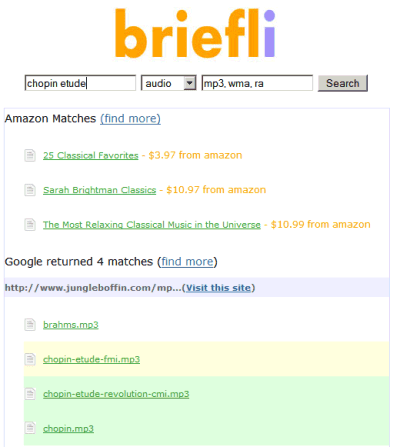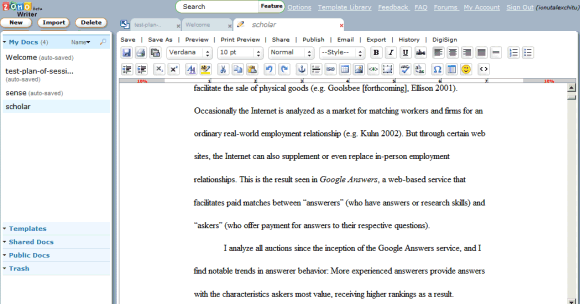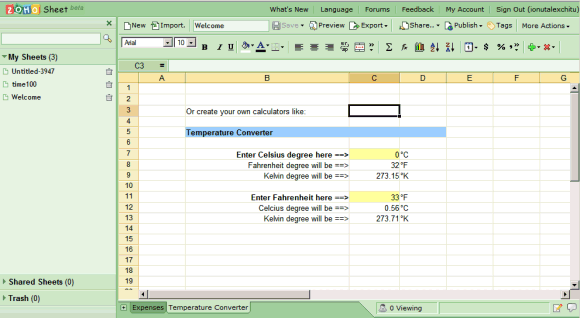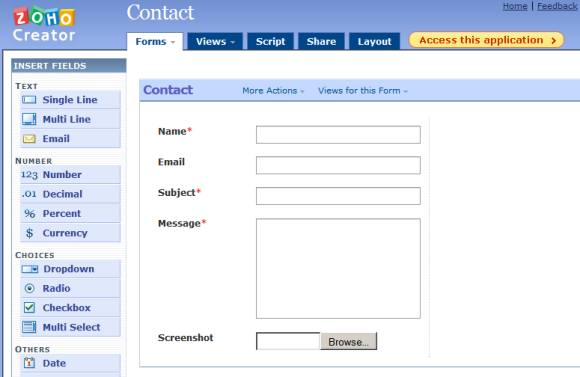If you've ever visited
Google Docs & Spreadsheets Group (a place where users ask questions about the product, report bugs or share their ideas), then you must have read one of the
many insightful posts written by ahab (André Banen), who - contrary to what many think - doesn't work at Google.
Can you tell us something about yourself?Well, I'm a home maker, male, too short for my weight, 54, married and having two adult sons, Dutch and living in the Netherlands, I was trained as a technical programmer. And I like cats.
How would you define the concept of spreadsheet to someone that didn't use one?Basically a spreadsheet is like a big grid - like on paper. In a square on the grid you can put some data like a number or e.g. a name or a date or a time. In other squares you could write a formula - like an addition or multiplication or something more complex. In these formulas you can instead of number use references to other grid squares. So a formula would become something like: take the value from the square on the first row and the third column and multiply it by three; written in a math notation of course like =C3*3 where C is the third column.
In a spreadsheet these squares are called cells. And the formulas compute without you having to use a calculator. But basically a spreadsheet is not more than that.
What spreadsheet software have you used and what's your favorite one?I worked with a good number of spreadsheets. I used
As-easy-as in the past, wrote a course and gave it for
Uniplex but that was long ago, used and tinkered a bit in
TurboCalc :), used the free
Sphygmic spreadsheet, obviously Works or Excel when they came in handy, and recently the on-line ones like
iRows,
Trimpath/
NumSum,
EditGrid,
Google Spreadsheets. I don't really have a favourite, but I'd like to test out
Gnumeric because it claims to be more precise than other spreadsheets. However currently I stick with Google Spreadsheets because it is so easy to access from anywhere.
What do you think about all these web apps that try to replace or complement existing desktop applications?The new 'Web 2.0' apps as they're sometimes called, try hard to become interesting. But they are seriously hampered by the limitations and incompatibilities of the browsers in use. So the web apps do not yet 'cut the cake'. For instance when I'm editing a complex spreadsheet formula I find myself often using PC based software like
PSPad, a programmers editor that lets me use regular expressions, and - like I needed yesterday - switch between opening and closing parenthesis. Many of the current web apps could easily be replaced by web accessible storage which would act like a U3-enabled USB-memory-stick.
As a matter of fact I think that the development of web apps is a step back in creating quality software. Programmers are back to so many restrictions that were thought to have disappeared, like the size of an application or the time it will take to load. And at the same time these web programmers are using unwieldy tools like 'compilers' that translate Java code into JavaScript. Which doesn't help either to make their creations light and swift.
How did you discover Google Docs & Spreadsheets? Did you use other similar applications?I found out about Google-Labs Spreadsheet. It had come into beta - which is Google talk for usable by the ordinary users, I think - and it seemed exciting, free software with which you could actually do something 'useful'. Later when Writely merged with Google-Labs Spreadsheet, I got the Write/Wordpad competitor for free in the Docs & Spreadsheets package. Actually Google-Labs Spreadsheets was the first new web 2.0 app that I actually used, to others I just gave a glance. It must have been because I was already using Gmail for some time, which of course was the real first web app, but I was using that mainly because of its free storage, not because it looked so exciting.
If you were Google, how would you convince a Microsoft Excel user to try Google Spreadsheets?I wouldn't try to convince Excel user to swap to Google Spreadsheets by suggesting compatibility - for that is not the strongest point. I would suggest easy access, storage on line and collaboration as major selling points. A really die-hard Excel user should not try Google Spreadsheets, that would mean a big disappointment. But people wondering if they should fork out a lot of money to buy Excel as their first spreadsheet software definitely should try Google Spreadsheet, as its value for money completely beat Excel's. After all Google Spreadsheet is free.
Google said in many occasions that it doesn't want to compete with Microsoft Office. Do you believe this?Yes, I do believe Google does not want to use Docs & Spreadsheets to compete with Microsoft Office. D & S would compete with Microsoft Works, but that is with the current version. Soon a web applications like Presently will be added to the Docs & Spreadsheets; and Presently is supposed to be a kind of PowerPoint. Also Google still has JotSpot in the works. And JotSpot could become much more interesting than Docs & Spreadsheets is now as it is not aimed at being a web imitation of a desktop based suite of programs. Instead it's aimed at web communities and giving them the tools to make these work in a Wiki-like style; and there is no real Microsoft desktop competitor for that.
How much time do you spend helping other people at Google Docs & Spreadsheets Group and why do you do it?I spend quite a lot of time in the D & S forums. I like helping people take that first hurdle. And essentially they often just need someone that tells them they are on the right track. And of course I get the pick of interesting spreadsheet problems. It's always a short but sweet feeling when you can crack a problem. And to be fair, I did learn the most by answering other people's questions, because many people want to know different things that oneself finds interesting; so you get to dig deeper.
Do you remember any intriguing question from the Google Group?That's a hard question. Many questions are intriguing but the most interesting ones are questions like, can you make the spreadsheet dynamically sort its data or can you make look-ups in a spreadsheet as if it was a database?
How to ask a good question?People shouldn't be shy to tell what data they have, what they want to accomplish. They often are asking generic questions when they really should be referring to their own spreadsheet. Many people don't realize that putting a question the right way is the first step to solving a problem.
When you write your post and you are being precise, you get often very near the solution.
You must be using Google Docs & Spreadsheets a lot. Can you give some examples of real-life problems solved using Google's tool?What gave you that impression? I basically use Google Spreadsheet as a hobby. And to find out how far I can stretch the envelope when it comes to 'programming' a spreadsheet. I didn't make any ledger spreadsheets, if that is what you like to know, but I did experiment a bit to find out how you can make a spreadsheet dynamically sort, or how to create a 'query' interface with the limited options available. If those can be considered real-life problems I worked on solving them
Do you have some tips for working with Google Docs & Spreadsheets?Don't set your expectations to high, but rather try to find out what you can do within the limits that this suite of web apps currently has. Realize that Docs is more like Write or Wordpad than it is like Word; and that Spreadsheets is closer to Works Spreadsheet than to Excel.
Don't forget to browse the Help; start for instance with searching for 'shortcut' to get a comprehensive list of keyboard shortcuts used in D & S. Spreadsheet users, of course, should also bookmark
GSSFAQ.
How many docs & spreadsheets do you have online and how do you organize them?I now have about 266 on-line. And, as I'm a bit chaotic, I don't organize them very well. So the search box comes in handy very frequently.
I don't regret not using tags (now folders) that much; the facilities to use tags were already very limited as they are now for folders. I think had Google D & S implemented labels with their search tools like in Gmail I would be employing these much more often.
What's your favorite...(How hard it is too choose; I'll make a random pick from the many favourites I have)
... bookGödel, Escher, Bach: an Eternal Golden Braid, by Douglas Hofstadter
... filmThe Party (with Peter Sellers), directed by Blake Edwards
... song'Ombre opache' aria from 'Correa nel seno amato by Ale'ssandro Scralatti,
performed by the Leonhardt Consort and the baritone Max van Egmond
... programming languageDialect - small, but a great tool. Development has stalled unfortunately because it was developed using MS-C++ before it became open source.
... softwareThe microcode in the Intel Pentium 4 CPU of my computer. If that piece of software wouldn't work the rest would be worthless.
... web siteIt's a bit carny to say, but it's www.google.com
... inventionThe windmill. A bit of an undervalued invention, but one that we will employ in the coming ages, if all goes well but also when things go bad.
... human virtuehumor ... idea sourceMy own brain. I've been filling it up for more than half a century, fortunately it will give something back now and then...
And for the people of the Google D & S team that chance upon this interview: buy yourself a copy of The Mythical Man-Month by Fred Brooks and read it. Then you will understand what is meant by "Plan to throw one away; you will, anyhow".



















 After having
After having 


